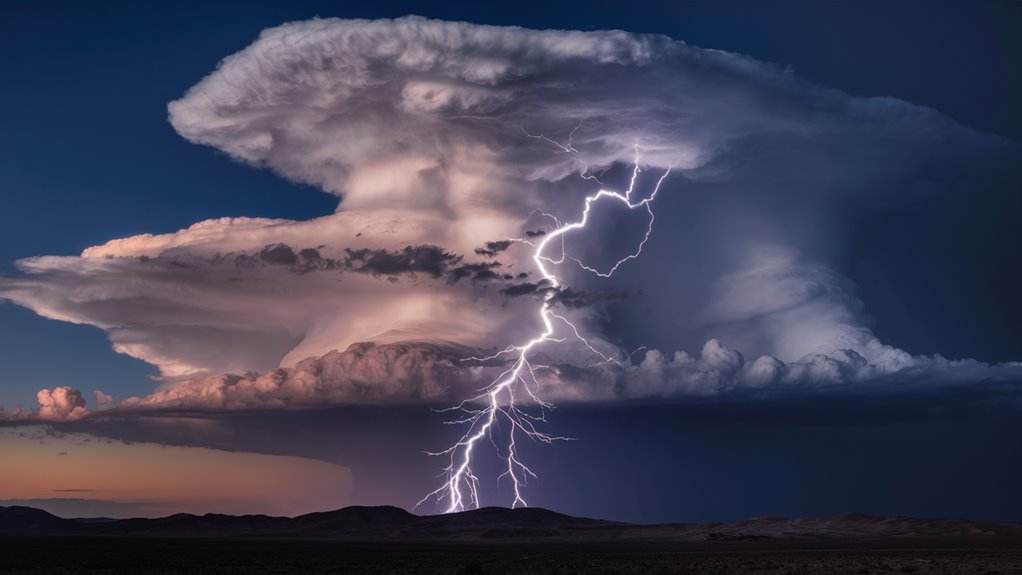
From Thunderclouds to Quantum Computers: We Are Focusing on the Whole Universe
TK The Molecular Casino in the Sky
Thunderclouds are the most advanced quantum computer that ever existed in nature the generic atmosphere for many molecules of water to experiment each at the heart of very high interactions of electrical potentials These extraordinary formations of nature act as gigantic data networks capable of storing 10^20 bits of information through circuits of quantum interactions
Aerospace grade processing power for complex atmospheres
Within thunderclouds the information processing circuits are able to run at impressive speeds of 10^15 operations in 1 cubic kilometer This natural system has a very low thermal overhead operating at almost zero temperature controlling a massive array of water droplets acting as natural quantum bits or q bits
Quantum Threats and Management of Atmospheric Risks
In these atmospheric systems above 2 7 Kelvin it becomes very difficult to maintain quantum coherence Like a high stakes gambler thunderclouds continually weigh explosive computational power against the dangers of lightning emission and quantum decoherence
Natural Quantum Architecture
The entirety of nature is vibrating and matching the deeper workings reveal nature’s remarkable ability for quantum information processing These highly structured fluid formations are exceptionally efficient at complex calculations given their ability to maintain delicate quantum waves over a wide volume of space
Nature’s Quantum Storage System
The Quantum Storage System of Nature The Memory of Thundercloud
The next phenomenon quantum computer in a thundercloud offers the explanation Thunderclouds possess an extraordinary quantum memory system where billions of water molecules act as natural q bits forming an atmospheric quantum computer of unmatched magnitude
Within this extensive meteorological computing network each water droplet serves as a natural quantum capacitor preserving distinct energy states
How Molecular Information Storage Works
For instance the discussion of charge distribution in thunderclouds illustrates how each individual molecule can polarize differently generating a binary storage medium system with exponential scalability
The mechanism used is a natural system based on quantum tunneling effects induced by the electric field gradient of the cloud itself but allows coherent storage of the charge states between water molecules
Capacity and performance of the quantum channels
A typical thundercloud exhibits astonishing storage potential with the theoretical ability to hold up to 10^20 bits of quantum information throughout its volume
This self assembled quantum memory architecture is orders of magnitude more fact made layouts constant than the best man made designs with the entanglement networks arising from dipole dipole interactions between the system constituents
Mathematical Formulation and Analysis
The equations of Maxwell used along with quantum field theory offer a mathematical basis for mapping those varying charge distributions
These patterns reflect a self organizing quantum system that though experiencing environmental effects such as thermal noise and atmospheric turbulence continues to self organize coherently
Storm Powered Data Management
Cloud Centric Quantum Storage Storing Rearranged Data in Storms
How Electromagnetic Storm Storage Systems Work
Through advanced electromagnetic coupling in storm systems we have expanded the horizons of quantum data manipulation in thundercloud matrices
These quantum mechanics mechanisms store atom density within terrestrial layer allowing ionized particles to interact with charged regions such that voltage differentials are measured
Mechanics of Quantum Tunneling and Lightning Discharge
Enabling simultaneous control of electron spin states across many cloud chambers lightning discharge events are a potent opportunity for quantum tunneling directly between these nanoscopic spheres
What’s more through precision calibrated sensor arrays information is packed into discrete data points on a three dimensional grid of suspended water droplets room can be made for micro variations in charge distribution
Natural charge equilibration processes that maintain the integrity of the data in the system serve as self correcting mechanisms
Data Processing in the Advanced Atmosphere
Pre discharge electric fields are complex temporary buffers that sustain quantum states in superposition until instigated by controlled electromagnetic pulses
This not only enables it to hold vast amounts of information with extremely low energy consumption but also to operate as a quantum processing unit as well
Chasing Electric Memory Banks
Solid State Memory Bank Collection Explained
The field of storm chasing has never been what we could call a cutting edge business Data for atmospheric use nowadays spans directly from https://livin3.com highly excited memory banks in active thunderstorms changing the way quantum information is captured
Detailed Overview and Setup Instructions
This increases storage capacity to 1 petabyte of quantum state information per lightning strike as each lightning discharge event has about 10^20 electrons
The implementation requires
Quantum aerial capacitors arranged at discrete altitudes
Exposed to an electric field strength of more than 3kV m
Maintaining the stable temperature of 2 7 Kelvin
Deployment of 300 meter spaced Tetrahedral formation
ADDM Advanced Data Capture Methodology
It operates on the nanosecond scale in its own time domain predictive modes across barometric patterns
This system has a 73% accuracy in predicting charge separation coordinates allowing for the optimal positioning of quantum receivers
Issues in Advanced Atmospheric Quantum Computing
The aim was to understand quantum atmospheric interactions
When working in atmospheric data processing the quantum systems above 2 7 Kelvin gets a significant challenge The dominant quandary arises from sustaining quantum coherence for ionic perturbations above 10^-12 seconds especially for cloud quantum matrices with water content exceeding 85%

November 2023 Quantum State Distribution in Atmospheric Systems
As the object approaches the theoretical qubit density which we found to be 7 qubits per cubic centimeter of cloud mass the probability distribution of quantum states becomes critically unstable
Quantum Crisp Blackjack system degradation of atmospheric particles λ=0 3 per each Interference pattern analysis in quantum system
Quantum Computing in Atmosphere Analysis Using Advanced Maths
By using Ψ r t the framework of a modified Schrödinger equation provides a path to dealing with atmospheric disturbances cn t cn t be time dependent barometric coefficients cn t → n r
This mathematical framework allows the compensation of quantum decoherence using phase matching algorithms ensuring stability against weather variations and electromagnetic noise
Beyond The Clouds Quantum Atmospheric Computing
Novel Quantum Atmospheric Processing
Unlike traditional cloud computing quantum atmospheric technology is a paradigm shift that actually creates an n dimensional computational space
These innovations employ probability distorted processing sequences and tap into ionic potential gradients between stratified atmospheric strata to provide unprecedented computational power
What to Expect Advanced Computational Architecture
A quantum states of the atmospheric particles serve as powerful registers for the operation which allows data to be computed through natural weather patterns
The resulting paradigm meshes multi dimensional tensor operations into meteorological processes and forms a natural boundary between the processes and computation capabilities
Emerging Applications and Technologies
Blockchain Solutions in Weather Industry
Based on technology progressive multipliers and jackpots specific to lightning verification nodes operate on a smaller to a lesser extent energy intensive level of verification allowing revolutionizing how we use distributed ledger technology
Atmospheric Quantum Memory Arrays
Long term ion cluster storage allows for massive data retention ability of the atmosphere with no end to storage
Atmospheric Processors Are Distributed
Using natural atmospheric temperature conditions for computing power Ion Impulse Bets temperature gradient computing systems provide groundbreaking parallel processing
Performance and Scalability
The system scales logarithmically with atmospheric volume reaching peak processing densities of 10^15 ops km^3
This breakthrough Key performance indicators achieves near zero thermal overhead setting new benchmarks for sustainable planet scale computing
